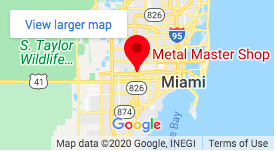So you know you want a metal roof, right? Well of course you do, you’re reading this, aren’t you?
But now how do you decide what kind of metal roof to purchase? What are the different qualities and traits to look for and how do you match them to your needs? And are there any limitations?
I want to focus on one aspect of metal roofs today: Gauge.
Now in many cases, especially when it comes to Miami waistlines at the beach, thinner is better!
But that doesn’t necessarily apply to other situations equally. One of those situations where thinner is not always the best option is in metal roofing.
The measurement for metal thickness is it’s gauge. From our online glossary (have you checked it out yet? It’s very helpful!), you can find a quick definition for the measurements I’m talking about.
Gauge: A standard of measurement. For instance, the thickness of sheet metal or the diameter of wire. The thicker the wire or metal, the lower the gauge.
Did you catch that last part? It might get you a little backwards but the higher the gauge, the thinner the metal and visa versa. The lower the gauge, the thicker the metal. So our Fabricate 24 gauge is thicker than the 032 Aluminum.
Why does thickness of metal roofs matter?
Okay, enough of that. What does it really mean to have a thinner or thicker gauge?
Different types of metal roofs will typically come in different size gauges.
Sheet roofing will tend to vary from 24 to 30 gauge.
Standing seam will be on the heavier side at 18 to 26 or 28 for the lighter roofing needs; and 24 and 26 gauge is most common for residential homes.
Shakes will usually be manufactured at 26 or 28 gauge.
Thicker gauge roofing will tend to be more resistant to impacts for obvious reasons, but thinner will weigh lighter and that’s a consideration depending on your roofing needs and the structural design of your home or building. And besides metal thickness, there are protective coatings, seals, and paint that can change the thickness as well.
Florida Specialty Roofing
So I’m sure you all know how special Florida is, you wouldn’t live here if you didn’t. But one thing you have to keep in mind is the Florida Building Code. That thing is DETAILED.
As you can imagine, our buildings have to be able to stand up against the roughest weather around. And they have to do it year after year after year.
At Metal Master Shop, we prefer 24 gauge galvalume (trade name for a protective coating composed of aluminum zinc) or 032 aluminum for Miami because it is a high quality product and it fits the building codes for roofs.
We have the strictest roofing codes in the country, so trust us when we say this is the best and toughest product.
This can be a tricky subject, so please feel free to come to us with any questions you have about metal roof gauges and what is best for your home. We’re the experts and we’re here to help!
-J.C.






Comments are closed.